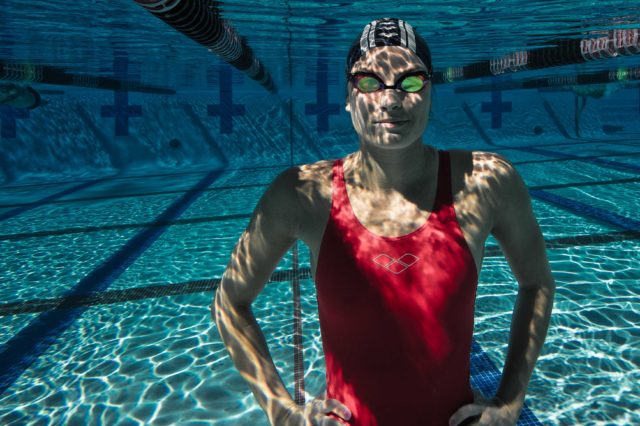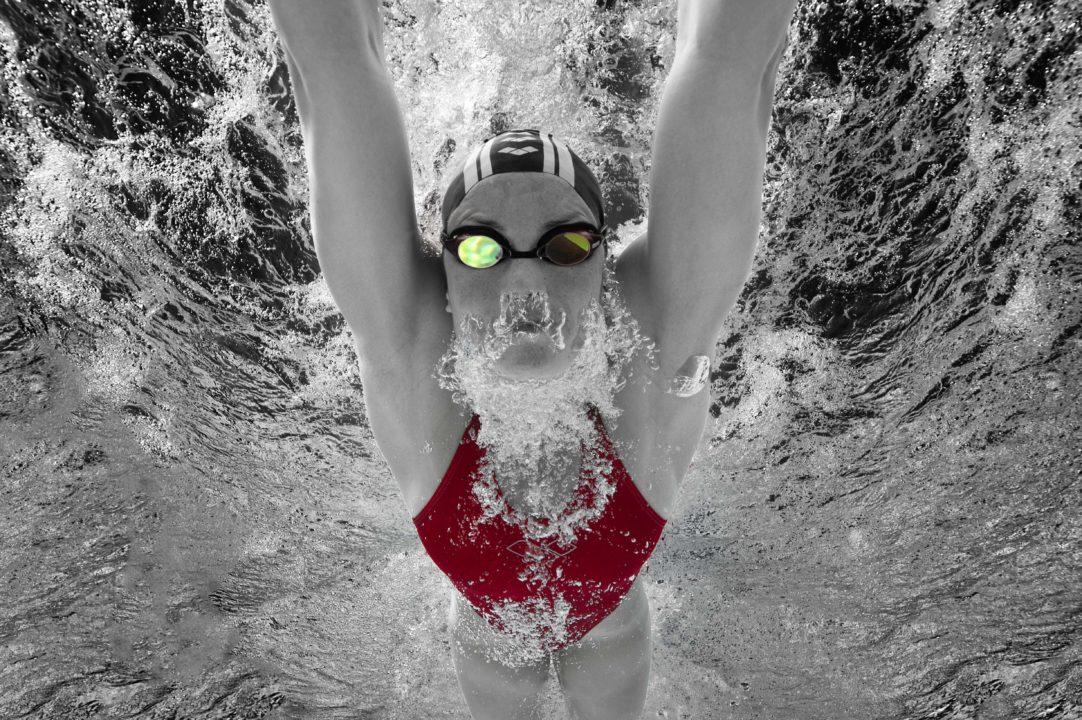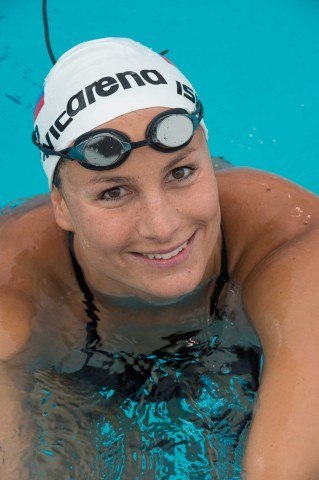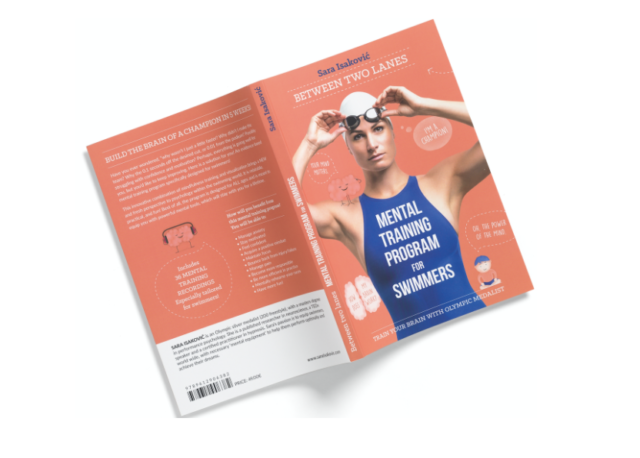Courtesy of Olympic medalist SARA ISAKOVIĆ
I was 12 years old when I started tapping into the power of my mind. Watching Sydney Olympic Games (2000), glued to the TV screen, I was admiring athletes that marched around the Olympic stadium and imagining myself doing the same in a few years time. I’d walk around my room pretending to be at the Olympics, holding a little flag and waving my hands at the imaginary crowd. I found it natural to dream. These visions were completely my own, they were genuine, and never forced. That same day I announced out loud, “Mom, dad, I’m going to the next Olympics!” And so I did. I was 16 in Athens. With my best time that year, I would have placed 5th in the 200 free final, but I froze. I swam 1.5 seconds slower and ended up 18th. When I got home, I knew my next Olympics was going to be different. I purposefully drew out my vision and stuck it on my wall: Olympic gold medal, with a World Record time 1:55.00. In the 2008 Olympics I decided to win a medal. And I did.
My entire career I heard people say, “Sara is different, she’s committed, motivated, she was born positive.” Not true. I was just like every other kid, but I dared to dream and intentionally create a vision for myself that guided me through life. Ever since I was little my mom (a former swimmer) encouraged me to visualize my races ahead of time. I took the mental practice seriously. Before every race, I found a quiet space, covered my head with a towel and mentally repeated my race (true fact, I even have it on camera), while other kids were running around the pool deck asking each other, ‘how fast are you gonna swim?’ Years later, I used this skill to rehearse my 200 freestyle in Beijing. I ‘swam’ the race 300 times before I even got to Beijing Olympics. I ended up winning Silver, with a time of 1.54.97, which made Federica Pellegrini (gold medalist) and I the first female swimmers under 1.55. So I did break the WR, just didn’t get to keep it. For me my silver was like gold – the first swimming medal won for my country.
Again. I wasn’t any different. I just understood how crucial it is to set a goal. Rehearse it mentally and keep my mind calm in the process. I practiced positive self-affirmations daily, I used to breathe deeply and blow bubbles into the pool (to stay calm and focused), I used body imagery to manage pain, acquired healthy habits in and out of the pool, and learned to manage my emotions. I was a master at not letting in others’ negativity, nor did I succumb to outside pressure. (There were some really difficult times too! But before Beijing I was in a different head space).
Reflecting back on my career, I’m beyond grateful. It makes me realize how incredibly lucky we athletes are to be able to train mental resilience every day. It’s a true privilege. We have a choice every single day– We either, 1) use the power of our minds to our own benefit, or, 2) sabotage ourselves with doubts, worries, and feelings of anxiety.
Don’t get me wrong, I too had lots of negative thoughts, but I worked very hard for my healthy, productive mindset to switch to action. Some mornings, at 5:10am, I’d pray for my coach to sleep through his alarm and miss practice, or hope that the water magically disappeared, so I could say, “aw that’s unfortunate, let’s go back to bed”. On the other side, I learned to take my drama-filled thoughts less seriously. I understood they were only symptoms of stress, and made a conscious choice to switch my attention to mastering that day’s workout.
And that’s it. No rocket science, just a million percent commitment to training my mind as much as the body. It didn’t take much. Just a little awareness. Shifting more of my attention to what is going on inside my head, and staying super in tune with how every thought affects my body.
So, this brings me to the topic of mental training. And consequently, lot’s of ‘WHY’ questions.
Why aren’t mental skills purposefully taught to young swimmers? (Here I mean 10 year olds). Just the way they acquire knowledge on swimming techniques, why not talk about how their brain works? Why not teach them how to stay mindful, focused, playful, confident, motivated…etc. These skills raise the effectiveness level of practice, even more, turn hours of hard work into optimal performance. We all know this, yet we take no action.
We wait. We wait till swimmers are 16, making junior teams, later national teams, we wait till college, even worse, we wait till swimmers make the Olympics! That’s when psychologists are introduced. Usually at a time when something goes ‘wrong.’ Help is offered when a swimmer loses motivation, has performance anxiety, confidence issues…etc. Great, but in my opinion, a bit too late.
We now have THE most perfect timing to admit the mind matters, especially with Coronavirus allowing us to pause our lives, reflect and turn our attention inwards. It’s a period of time, which will prove to all of us that individuals with the highest levels of mental resilience will walk away strongest, both athletes and non-athletes alike. But let’s stop pretending the mind will train itself. OR. Believe that mental training is reserved for the elite. It’s about psychological well-being, it’s about skills and tools that will help swimmers become better humans, be kinder, more compassionate, more patient, more daring, more focused, you name it. This is the essential equipment swimmers deserve, not just fins and paddles. The life long skills and tools that will help them battle their negative minds in and out of the pool and feel good in their own skin.
It’s about all of us – giving ourselves a chance to feel whole and be the best we can be. Trust me, swimmers would love to know ways to make their life easier. Coaches would love it even more. Let’s not forget how grateful parents would be! Right parents? If we could raise awareness of all individuals involved in our sport, it’d be a much more relaxed space. A space full of curiosity, growth and most importantly fun.
Let’s welcome the next few facts, and then dive into a NEW pool of ideas and solutions!
5 mental training facts we can no longer ignore:
- Mental training is KEY to optimal performance.
We all know this. Millions of articles have been written, tips and tools given, yet ironically, very few people actually get to the training. Mental battles continue to be real. Swimmers struggle on the inside, they are limiting themselves with destructive thoughts and belief systems, living in fear and feeling overwhelmed (I know I was scared of practice at least 3x a week). For practice to be purposeful, swimmers need to be present. For racing to be effective, swimmers need to be daring, fierce, playful and confident. All these characteristics are manifestations of the mind.
- Mental resilience is trained, it’s not a given.
Many athletes from various sports have talked about purposefully working on a resilient mindset (tenis, judo, golf, gymnastics, basketball, american football..). In swimming, it is still assumed champions are born with given mental powers, or, expected that swimmers somehow ‘figure it out’ on their own. It’s the same as waiting and hoping swimmers figure out their back-to-breast turn by themselves or manage a broken bone.
- Mental training is meant for everyone.
True. Mental training is meant for athletes, coaches, parents, and everyone else on this planet. It’s not only reserved for elite level athletes. If every human felt the responsibility to take care of his/her state of mind, it’d be an even brighter and more optimistic world.
- Mental training is evidence based and backed up by endless scientific research.
The majority of the swimming world (I can speak for the country I’m from) still see mental training as some ‘guru-type’ practice. The word meditation is very strange. Mental coaches are seen as phony and fake. Makes sense, it’s an unfamiliar area and it feels uncomfortable. People aren’t used to managing themselves, they are preoccupied with managing others. Today, we can no longer hold on to such attitudes and beliefs. Researches publish the positive effects of mindfulness training and visualization every day. There are tons of articles and books, but most importantly, personal experiences shared by athletes from all around the world. Believing in science is great, but getting to the training is key. Experience is what matters most.
- You can train your brain anywhere at any time.
Mental training doesn’t necessarily require a specific location or a set amount of time. (This is usually what scares people, because they have ‘no time.’) Swimmers have the capacity to observe their minds on the way to the pool, while swimming, in school or just before falling asleep. Parents and coaches too can train self-awareness, simply by paying attention to how they express themselves (both their thoughts and emotions), noticing the body language they use, and role-modeling healthy behavior. It is true that meditations take up a few minutes (I actually believe they add minutes), but squats and planks do too!
So. Where to start?
“Between two lanes” is the place.
It is our home– both mentally and physically.
You no longer have to wonder how to equip swimmers (or yourselves) with relevant mental skills. I’m happy to say I prepared the tools for you! For the first time in swimming history, our sport now has its own mental training material! I named the program “Between two Lanes,” because we swimmers spend most of our lives between two lanes, whether in training or competition. And in this very space, the mind matters. Over the past few years the program has been enjoyed by numerous swimmers, coaches and swim clubs around the world. Recently the material has been endorsed by multiple Olympic Champions and global swimming legends (Natalie Coughlin, Oussama Mellouli, Milorad Cavic..),
Visit my website saraisakovic.com to find out more! You’ll also get lots of free content and gain more insight into the mental training material. Swimmers – I also prepared special visualization recordings for you to listen to during this uncertain Coronavirus period. CHECK THEM OUT!
Here’s a general overview of the program!
What is Between two Lanes?
Between two lanes is an evidence-based mental training program, specifically designed for swimmers. It is an innovative combination of mindfulness training and visualization techniques, bringing a NEW and fresh perspective to psychology within the swimming world. It is relatable, practical, and fun! Best of all, the program is designed for ALL ages and is meant to equip swimmers with powerful mental tools, which will help them stay resilient for life, both in and out of the pool!\
What does the program offer?
- 180 pages of written material
- 36 mental training recordings
Which topics are discussed/trained?
Intro: Fun neuroscience (understanding of brain function under stress) + learning why awareness is key to psychological resilience
Week1: Breath Awareness
Week 2: Awareness of Thoughts & Emotions
Week 3: Body Awareness
Week 4: Attitude Awareness
Week 5: Mental Movie Streaming (learning to visualize)
How will you benefit from this mental training program? You will be able to:
- Manage anxiety
- Stay motivated
- Feel confident
- Acquire a positive mindset
- Maintain focus
- Bounce back from injury/failure
- Manage pain
- Become more responsible
- Be more efficient in practice
- Mentally rehearse your races
- Have more fun!
Program purchase is available directly Here!
For any additional information, feel free to contact me at [email protected]
_____________________________________________________________________________________
More about the Author
SARA ISAKOVIĆ is an Olympic silver medalist (200 freestyle), with a Masters degree in performance psychology. She is a published researcher in neuroscience, a TEDx speaker and a certified practitioner in hypnosis. Sara’s passion is to equip swimmers, world wide, with necessary ‘mental equipment’ to help them perform optimally and achieve their dreams.

Keeping her head in the game is what Sara considers a major factor for success in Rio (photo: Mike Lewis, Ola Vista Photography)
Courtesy of Sara Isakovic, a SwimSwam partner.



